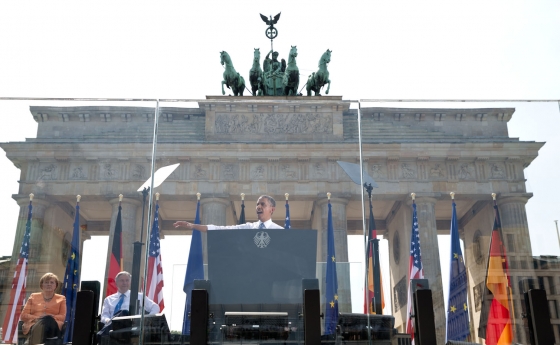*Stop Press*
In the still developing story of NSA’s Prism program (see Toby Feakin on The Strategist earlier this week if you missed it), the Guardian newspaper has published the classified ‘rules’ that NSA follows in using intercepts of American’s conversations. These are the equivalent of the rules to protect Australians that appeared at the end of Andrew Davies’ Strategist post on intelligence oversight on Thursday. As the New York Times observes:
[Administration comments to Americans that] ‘nobody is listening to your telephone calls’ left out what NSA officials have long called “incidental” collection of Americans’ calls and e-mails—the routine capture of Americans’ communications in the process of targeting foreign communications.
This week at the Brandenburg Gate in Berlin President Obama said that:
After a comprehensive review, I’ve determined that we can ensure the security of America and our allies, and maintain a strong and credible strategic deterrent, while reducing our deployed strategic nuclear weapons by up to one-third.
…as long as Russia was prepared to join him (you can see a video here, and the full text here). The speech comes a little over 4 years since he said in Prague: ‘I state clearly and with conviction America’s commitment to seek the peace and security of a world without nuclear weapons’. Meanwhile, the opposition Republicans aren’t thrilled, and the Department of Defense continues to invest in nuclear weapons and their delivery systems.
The latest Stockholm International Peace research Institute yearbook is something of an event in the peace and arms control community. This year’s report (PDF) contains mixed news. Thanks entirely to American and Russian efforts, the world’s nuclear arsenal shrank by an estimated 1,735 warheads last year, with, with the decrease in the former Cold War blocs being partially offset by an increase of around 20 between India and Pakistan.
In the Middle East, Iran’s election surprisingly brought a moderate cleric, Hassan Rohani, to power. But although it’s been hailed as a surprisingly democratic outcome, there’s doubt about whether it will make much difference to Iran’s nuclear trajectory.
And after confirming that the Syrian government used nerve gas in the civil war, Washington has said it will provide military support to the rebels. The text of the white house statement is here.
For those readers who want to know what it’s like to work in intelligence, it seems that applying for a job at DIO and waiting months for the security clearance might be very 2010. These days the cool kids are doing their own spying on North Korea.
One of the executive editor’s favourite websites when he wants to feign work is the National Security Archive at Georgetown University. The archivists are active users of FOI laws and compile essays with links to a wide range of primary source documents. On ‘exhibit’ at the moment is a series of pieces on the Cold war of the early 1980s. Particularly chilling is the account of the Soviet reaction to a NATO exercise in 1983 which was interpreted as consistent with the preparation for an American pre-emptive strike.
Lastly, if you are in Canberra next Friday, June 18th , Admiral Dennis C. Blair, former Director of National Intelligence, will discuss “ how US views of China are emerging and what the world has learnt about Beijing’s intentions over the last few years.” The talk will be at 5:45 at ANU – details and registration here
Image courtesy of The White House..


